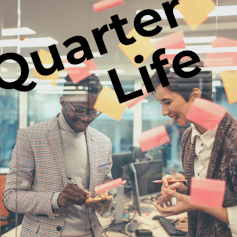Are you in a relationship with someone who grew up speaking a different language to you? Perhaps you’re dating, and wondering about your long-term future. You’re far from alone.
In 2021, 9.5 million of the people in the UK – 14.1% of the population – had been born abroad. This means that the landscape of relationships is likely to have become more diverse. These relationships often unite people from varied linguistic and cultural backgrounds, offering both enrichment and challenges.
This article is part of Quarter Life, a series about issues affecting those of us in our twenties and thirties. From the challenges of beginning a career and taking care of our mental health, to the excitement of starting a family, adopting a pet or just making friends as an adult. The articles in this series explore the questions and bring answers as we navigate this turbulent period of life.
You may be interested in:
Christmas films: there might be some truth to stories about hometown romances, according to research
Workplace romance: four questions to ask yourself before dating someone from the office
Online dating fatigue – why some people are turning to face-to-face apps first
Effective communication is a cornerstone of success for intercultural relationships and will help in avoiding potential pitfalls. Language is our primary conduit for communication, and when partners do not share a common language, it can lead to misinterpretations, frustration and conflicts.
Relationships between people who speak different languages are the subject of my recently published book. Here are some insights that may help you build a strong foundation for your relationship.
Learn each other’s languages
It’s likely that you and your partner have picked one language as your main form of communication. But this is just the beginning. Language is dynamic and evolves over time, much like your relationship itself. As your bond deepens and matures, your language skills should similarly progress. When interviewing intercultural couples for my research, I found that one partner’s lack of investment in learning the other’s native tongue could be a source of tension or disappointment on both sides.
Philosopher Ludwig Wittgenstein said: “The limits of my language mean the limits of my world.” The language of emotion is often deeply tied to one’s native tongue, rendering it inherently untranslatable.
This awareness is important for intercultural couples, who may not have the vocabulary in a second language to express everything they feel.
Recognise that you’ll never stop learning
Continuous learning and growth in each other’s languages and cultures are essential for the vitality of an intercultural relationship.
Neglecting to embrace and appreciate each other’s languages within a relationship can give rise to a slew of challenges. Communication breakdowns, misunderstandings, and frustration can chip away at the connection between partners.
Moreover, the burden of communication often falls disproportionately on the partner who is less proficient in the chosen common language, potentially leading to feelings of loneliness and isolation.
An open-minded approach to language learning can nurture a deeper connection and help avert potential problems. This approach encompasses not only language acquisition but also an appreciation for the customs, traditions, and worldviews associated with your partner’s culture.

Inside Creative House/Shutterstock
For example, when you actively listen to their experiences about how they were raised, it allows you to connect with them on a deeper level, gaining insight into the key moments that have shaped their life.
Cooking together with ingredients and recipes from your partner’s culture can be a delightful way to strengthen your bond as you explore the rich flavours and stories behind each dish. Attending cultural events and festivals together immerses you in their world, creating shared memories and a profound sense of belonging.
Travelling to your partner’s country offers a firsthand cultural experience, where language serves as a bridge to understanding locals and their way of life. Watching films and dramas that reflect your partner’s culture provides a window into the storytelling and emotions deeply rooted in their heritage, sparking meaningful conversations and shared interests.
This deeper understanding can foster empathy and respect, laying a solid groundwork for a thriving relationship.
A relationship goes beyond a couple
An intercultural relationship extends beyond the couple. It encompasses a wider social circle, including family, friends and potentially children. The integration of diverse linguistic and cultural elements into a relationship can have a positive ripple effect on those around you.
Imagine a couple who actively embrace each other’s cultures and languages. They not only communicate effectively with each other but also extend their openness to their in-laws, extended family and friends. As a result, their relationships with these people become more enriched and dynamic.
For instance, when they host gatherings, they could incorporate elements from both cultural backgrounds, such as traditional dishes, music or customs. This not only creates a vibrant and inclusive atmosphere but also encourages guests to learn about and appreciate different cultures and feel at home.
This open-minded approach can have a positive impact on children too. Growing up in an environment where multiple languages and cultures are celebrated, children develop a strong sense of cultural awareness, adaptability and empathy. They become more open to embracing diversity in their own lives and interactions.
On the other hand, unresolved issues stemming from language and cultural differences can lead to tensions and misunderstandings among family and friends, adding unnecessary strain to relationships.
Intercultural relationships are a testament to the beauty of diversity and the potential for deep connections across linguistic and cultural boundaries. While language differences can present unique challenges, they also offer an opportunity for personal growth and a richer, more profound connection with your partner.
Credit: Source link




